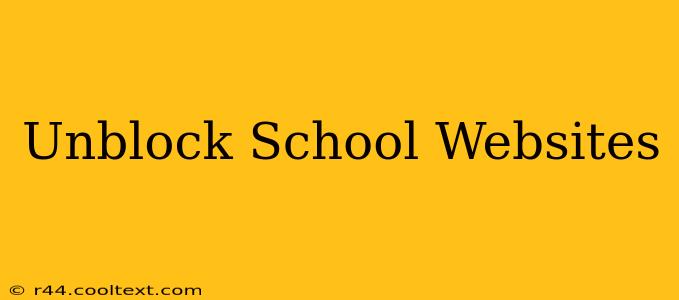School internet restrictions can be frustrating, especially when you need access to specific websites for research, homework, or personal enrichment. This guide explores various methods to unblock school websites, emphasizing safe and responsible practices. Remember: Always adhere to your school's acceptable use policy; circumventing restrictions for malicious purposes is unacceptable.
Understanding School Website Blocks
Schools implement web filters for several reasons:
- Protecting students: These filters aim to shield students from inappropriate content like violence, hate speech, and adult material.
- Enhancing productivity: Blocking distracting websites helps students focus on their studies during school hours.
- Complying with regulations: Schools often adhere to federal and state laws regarding internet safety and student data privacy.
Understanding why websites are blocked is crucial before attempting to bypass them.
Safe and Acceptable Methods to Access Blocked Websites
While circumventing school internet filters might seem tempting, it's essential to do so responsibly and ethically. Here are some safe and acceptable approaches:
1. Contact Your School's IT Department
The most straightforward approach is to request access through official channels. If a website is essential for your studies or a legitimate personal need, contact your school's IT department or librarian. They can assess the situation and potentially grant access or suggest alternatives. This is always the preferred method.
2. Utilize a School-Approved VPN (If Available)
Some schools provide Virtual Private Networks (VPNs) for accessing resources outside the school's network. If your school offers a VPN, use it as intended. This is a secure and legitimate method for accessing approved resources.
3. Explore Alternative Resources
Before resorting to bypassing filters, consider if alternative resources can provide the same information. For example, if a specific website is blocked, search for similar information on other websites, school databases, or library resources.
Methods to Avoid (Ethical and Security Concerns)
Several methods exist to bypass school internet filters, but many pose ethical and security risks. We strongly advise against using these methods:
- Proxy Servers: While some proxy servers appear harmless, many are unregulated and could expose your device to malware or phishing attacks. Using an unverified proxy server could compromise your personal information and violate school policy.
- VPN Services (Unofficial): Using unauthorized VPNs can be risky and might violate school rules, leading to disciplinary action. Furthermore, free VPNs often have poor security and may log your activity.
- Tor Browser: While designed for anonymity, Tor can be misused and is generally not suitable for circumventing school internet filters for academic purposes.
Conclusion: Responsible Internet Usage
Navigating school internet restrictions requires responsibility and ethical behavior. Always prioritize contacting your school's IT department for assistance. Avoid using unofficial methods that might compromise your security or violate school policies. Remember that respecting school rules and utilizing resources responsibly contributes to a positive learning environment. Prioritizing responsible digital citizenship is crucial.

